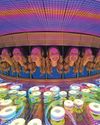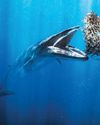
Located in Cambodia, a country in southeast Asia, Angkor Wat is the world’s largest temple, and a hugely important historical site. It stands within the ancient city of Angkor, which was one of the biggest cities in the world in the 13th century. Angkor was much bigger than the largest cities of Europe that existed at the same time.
Despite Angkor’s great size and importance, the site is shrouded in mystery. Little is known about its past and even its original name has been forgotten. The temple’s modern name, Angkor Wat, simply means “city temple” in Khmer (Cambodia’s official language). At one point, the city was abandoned, and no one knows why or what happened to the people who lived there. Let’s take a journey through the mists of time, and see how science has tried to uncover the secrets of this ancient monument.
A mega city
Angkor Wat was built to house the remains of a king called Suryavarman II after his death. The temple was completed around 1150, shortly after the king’s death. It was designed to be a version of heaven on Earth, with lots of incredible carvings and decorations.
この記事は The Week Junior Science+Nature UK の Issue 78 版に掲載されています。
7 日間の Magzter GOLD 無料トライアルを開始して、何千もの厳選されたプレミアム ストーリー、9,000 以上の雑誌や新聞にアクセスしてください。
すでに購読者です ? サインイン
この記事は The Week Junior Science+Nature UK の Issue 78 版に掲載されています。
7 日間の Magzter GOLD 無料トライアルを開始して、何千もの厳選されたプレミアム ストーリー、9,000 以上の雑誌や新聞にアクセスしてください。
すでに購読者です? サインイン

Camera Obscura
Imagine stepping inside a dark room, where the only source of light comes through one small hole in the wall.

MANCHESTER SCIENCE FESTIVAL
From 18-27 October, shoppers at the Arndale shopping centre in Manchester, England, will face a giant spider.

Should musicians stop touring?
Multiple concerts travelling around the world have a big impact on the environment.

Are ghosts real?
Plenty of people believe in ghosts, but it's hard to find proof.

SMASH STEREOTYPES
In an extract from his prize-winning book, scientist and writer Adam Rutherford shows you how to use the power of science to fight racism. This chapter, titled Myth-Busting, is all about sport.

Animal awareness
What would it feel like to be another animal?

Hamza Yassin
Go behind the camera with a wildlife filmmaker.

WILDLIFE WATCH
Ben Hoare goes on a safari from his sofa to discover how nature documentaries are made.

Big bum breakthrough
A team of researchers who found out that mammals can breathe through their bottoms have won a prize at the lg Nobel awards.

A jaw-dropping undersea snap
A photograph of a Bryde's whale feeding on a heart-shaped \"bait ball\" of sardines has won the Ocean Photographer of the Year contest.